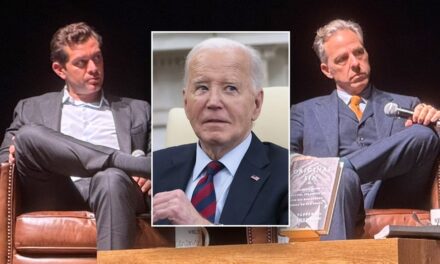In a fascinating turn of events that has garnered widespread attention, “Billboard Chris,” known for his provocative messaging on social issues, has recently found himself behind bars in what many consider to be the most progressive city in the United States. His arrest has ignited debates surrounding the contentious topic of transgender treatments for minors, further highlighting the intensifying cultural divide surrounding this issue.
For those unfamiliar, Billboard Chris—whose real name is Chris Elston—has become a controversial figure due to his eye-catching billboards and public demonstrations that advocate against the medical transition of minors. His platform argues that children should not be subjected to irreversible medical decisions before they reach adulthood and are fully capable of understanding the ramifications of such choices.
Elston’s distinct approach includes wearing billboards that display messages against the “gender-affirming care” model that has gained traction in many healthcare circles across the country. With slogans targeting the heart of the debate, he aims to raise awareness among parents, educators, and the general public regarding the potential long-term implications of such treatments.
The incident that led to Elston’s arrest occurred during one of his public demonstrations in San Francisco, a city known for its progressive stances on social issues, particularly regarding LGBTQ+ rights. As he stood holding his sign, Elston was confronted by a counter-protest organized by activists who support transgender rights and treatments for minors. The confrontation quickly escalated, leading to police intervention and ultimately, Elston’s arrest.
Following his release, Elston took to social media to express his discontent with the events that transpired. In his posts, he criticized the local government and law enforcement for what he described as an infringement on free speech. He argued that his right to share his perspective on a critical issue affecting children in society was unjustly curtailed by those who disagree with his views.
Elston’s supporters have rallied to his cause, emphasizing the importance of dialogue surrounding transgender treatments for minors. They believe that conversations should not be silenced and that opinions on such a vital issue deserve to be heard without fear of retribution. “Billboard Chris” has become a rallying figure for those who seek to question the prevailing narratives surrounding gender identity and medical interventions for youth.
In contrast, critics of Elston argue that his views are harmful and contribute to a culture of stigma against transgender individuals. Activists contend that gender-affirming care, when properly administered, can be life-saving for minors suffering from gender dysphoria. They argue that the pushback against such treatments can lead to increased rates of mental health issues and suicidality among transgender youth, who already face significant challenges in society.
As the debate rages on, many are left wondering where the balance lies between free speech and the protection of vulnerable communities. The push to protect transgender youth through medical intervention has gained traction in recent years, with numerous studies indicating the potential benefits of hormone therapy and puberty blockers. Proponents argue that these treatments can greatly enhance a minor’s quality of life and mental well-being, offering them an opportunity to live authentically in their gender identity.
On the other hand, there is a growing contingent that expresses concern over the long-term implications of such treatments. They argue that children and teenagers may not be fully equipped to make informed decisions about their bodies and futures at such young ages. Elston’s campaign aims to encourage parents and guardians to critically evaluate the information being presented by the medical community and to consider the potential risks involved.
This latest saga involving Billboard Chris has amplified existing tensions and brought the discussion of gender identity and children to the forefront of public discourse. The ramifications of this arrest and the passionate responses surrounding it illustrate just how deeply divided opinions are on this subject, which frequently sees claims and counterclaims from both sides.
The circumstances of the arrest have also raised questions about the role of law enforcement in political protests. Some legal experts suggest that such arrests may set a precedent that could infringe on the rights of individuals to express dissenting opinions in public spaces. The legal implications of this case may unfold as discussions around free speech clash with other societal values and norms.
As “Billboard Chris” continues to provoke conversations, his presence in public spaces serves to remind us of the urgent need for understanding and discourse amid the chaotic landscape of social and legal battles surrounding gender identity. For many, the resolution of these issues remains critical, as they believe that the stakes are extraordinary, with the lives and futures of children hanging in the balance.
While Elston seeks to challenge the status quo, calling for more scrutiny and debate about how society approaches such a sensitive issue, the response from the opposing camp remains fierce. Activists and allies emphasize the vital importance of affirming transgender identities and supporting medical treatments that can lead to healthy outcomes for youth grappling with their gender identity.
This incident in San Francisco serves as a microcosm of the larger national discourse on gender identity, free speech, and the rights of minors. It presents a unique case that will likely continue to evolve as more individuals engage in advocacy, either supporting or contesting the current medical practices concerning transgender youth.
In an era marked by increasing polarization, the challenge remains to strike a balance between understanding various perspectives while also fostering an inclusive atmosphere that supports the well-being of all individuals, particularly those who are most vulnerable. How this balance is achieved will be a significant aspect of the ongoing conversation in American society regarding gender, identity, and the rights of children. With activists mobilizing and protests both for and against medical transitions for minors on the rise, it appears that this discussion will persist, demanding attention and action in the coming years.
As we look ahead, one thing is clear: the story of “Billboard Chris” is far from over. The conversations he has ignited, the controversies his actions have spurred, and the responses from both sides of the debate will continue to shape the dialogue surrounding transgender rights and treatments in the United States. Whether viewed as a champion of free speech or as a provocateur contributing to harmful misconceptions, Chris Elston’s efforts have undeniably captured the national spotlight, prompting many to take a stance on a profoundly important issue.































